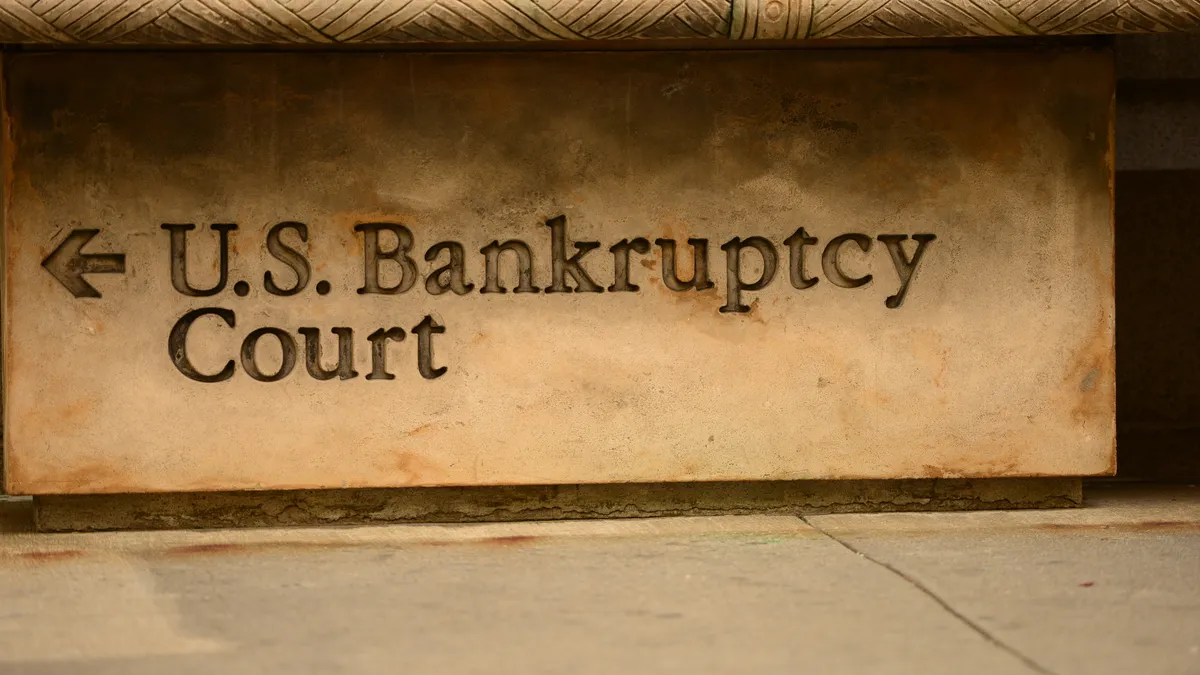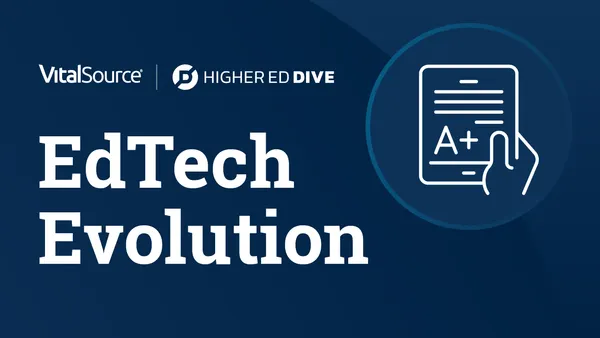Online program manager 2U's stock plummeted this summer when its leaders told financial market analysts that they expect to launch fewer graduate degree programs and expect smaller program sizes going forward.
It was the second time in as many quarters that 2U had changed its outlook, sending the company's stock price down nearly 65% by the market's close the next day.
The higher ed community appeared less concerned, however. For 2U had already been laying the groundwork for, and in many ways was underway with, a transition it hoped would help it keep pace with increasing competition within online learning.
Its approach reflects activity across the sector that has colleges and universities offering students a wider range of credentials and ways to earn them, and changing how they work with outside companies to provide them.
2U gave some insight into its shift earlier this year, when it shared a framework for its relationship with current and future college and university customers. Its "career curriculum continuum" runs the gamut from MOOCs to the high-end graduate degrees on which it made its name, and includes options such as short courses and boot camps.
In February, 2U announced it was partnering with an OPM called Keypath Education to support smaller and lower-tuition programs. And in April it made a splash saying it would buy Trilogy Education, a provider of boot camps to colleges and universities. In 2017, 2U brought online short courses into its orbit when it acquired GetSmarter.
Speaking to analysts in July, 2U CEO Chip Paucek acknowledged that students' options for online education "have expanded significantly." More schools are adding fully online or hybrid programs. And online education platforms are stepping up, too. Coursera recently made its courses available to colleges to use as their own, while edX has added and expanded master's programs on its platform.
Other ways 2U is responding to the competition include launching an online bachelor's degree with the London School of Economics and Political Science and rolling out a deferred tuition plan for one of its programs.
It has also indicated it may offer some customers the option of working on a fee-for-service basis, a move that would let it support smaller programs. That would mark a shift from its focus on revenue-share agreements, in which investment and other support from the OPM helps a university quickly stand up and run an online program in exchange for a cut of the revenue it brings in over time.
"Indeed, it's becoming obvious that all schools are going online," Paucek told the analysts, according to a transcript of the call. "We believe this represents a new reality in the marketplace and requires us and others to adjust to it."
'This is not just a story about 2U'
The investor community's reaction to the change in outlook has cast a shadow on some of 2U's progress, however. Bloomberg reported in November that one of the company's top shareholders may push it to explore strategic alternatives, such as a sale. And investors have filed a complaint alleging the company didn't accurately portray how competition in the industry was affecting its performance.
Some higher education observers have suggested that the need to pull back on growth expectations was apparent last year, when the company reported enrollment issues with two of its biggest programs.
"There's a lot more competition than 2U was willing to acknowledge, there were a lot of other players in the marketplace doing what they were doing, and there were a lot of universities doing a lot of really small things" online, said Trace Urdan, a managing director with investment bank and consulting firm Tyton Partners who studies OPMs.
"On a case-by-case basis that looks inconsequential, but what I think we've experienced is that in aggregate ... that starts to actually eat away at (a company's) ability to grow programs, and it starts to make the acquisition cost of the students much more expensive."
During a presentation earlier this month at Credit Suisse's Annual Technology Conference, Paucek tried to differentiate 2U the company and TWOU the stock.
"2U is much stronger than TWOU," he said, adding that the company is optimistic about the future.
"We're also really very cognizant that this didn't happen to us — we did it," he said. "We had a couple of periods in a row of missing expectations, and we don't take it lightly."
While the separation of the company and the stock "is important for analytic isolation," said Patrick Brothers, managing director and co-founder of education and market research firm HolonIQ in an interview with Education Dive, "the issue was that the team let them get too far apart."
"We believe this represents a new reality in the marketplace and requires us and others to adjust to it."

Chip Paucek
CEO, 2U
As higher ed experts interviewed for this story point out, 2U is in a tough spot. It's the only publicly traded OPM that functions solely as an OPM. That means the financial market analysts don't hear in quite the same way from its competitors about how they are identifying and reacting to challenges and opportunities in the market.
Others say those analysts should have been paying closer attention to trends within higher ed.
"There's an exuberance going on in the market that is dangerous, and you could even argue that it wasn't 2U's fault that the financial analysts were so exuberant," said Phil Hill, an ed tech consultant with the firm MindWires Consulting.
2U did not respond directly to Education Dive's questions asking about the timing of its changes and how its position as the only sole-OPM on the public markets may have affected the market's reaction.
"As demand for lifelong learning has grown, 2U has strategically expanded its product suite beyond our core online graduate degree business to empower our partners to meet the needs of students at every stage of their educational journeys," a 2U spokesperson told Education Dive in an email.
2U is, in many ways, joining a trend that's already underway. But its profile among OPMs makes its present situation one worth watching, Hill said.
"If they're saying the market is changing and they have to diversify and they are adding fee-for-service and they are recognizing that their clients have lower growth expectations than they previously thought — if 2U says that, every OPM should be considering a more conservative approach in their growth expectations," he said.
"This is not just a story about 2U," he added. "It's about what it says about the broader market."
Across the institution
One early indicator of how 2U plans to bring its recent changes together comes through an institution-wide partnership with the University of North Carolina at Chapel Hill, announced on a call with analysts in July. The arrangement will render 2U as UNC-Chapel Hill's "exclusive pan-university digital education collaborator," Paucek told analysts. The company has not elaborated on exactly what the arrangement will entail, and the university did not respond to Education Dive's email requesting comment for this story.
UNC-Chapel Hill was one of 2U's first partners, and the pair already work together on a set of online graduate degrees in areas such as public health, business and public administration. The expanded arrangement will let the partnership incorporate smaller programs on a fee-for-service basis, Paucek said on the call.
He followed up with more details on how the company expects to use the fee-for-service approach during the Credit Suisse event, saying it could be used with some of its existing, larger customers to add smaller programs.
The announcement is a marked shift from 2U's focus on revenue-share agreements, and it reflects some colleges' desire for more flexibility in their relationships with the companies that help them launch and grow their online offerings.
2U's new work with UNC-Chapel Hill also reflects a trend Hill sees among colleges and OPMs toward "more broad-based" partnerships in which the university — not a single academic program — is a key player. As an example, he points to the University of California, Los Angeles, which he said has taken steps to identify a group of OPM and digital services companies that could be used institution-wide.
'Competition with ourselves'
Working more widely with universities raises another question for 2U and its peers: How willing are schools to talk publicly about program outcomes, particularly for those run by OPMs?
In September, 2U issued a framework for disclosing that kind of information and called on its peers to do the same. For OPMs, that could include the existence of relationships with universities, certain enrollment data and outcomes measures such as retention and graduation rates. It suggests colleges should share standard OPM contract terms. The company said in a press release that it plans to issue a related report next year.
But higher ed analysts have questioned whether colleges and universities would be game to go public with such information. The issue is particularly touchy in light of criticism from watchdog groups and others about the nature of some colleges' contracts with online learning companies.
In September, a day after 2U issued its framework, The Century Foundation published a report calling out "red flags" in these relationships, such as contracts based directly on enrollment or tuition revenue or that are difficult to "reasonably terminate."
The report, which follows up on a similar review from 2017, takes a hard line on revenue-share agreements and suggests colleges have more flexibility when they work with partners on a fee-for-service basis.
A 2U spokesperson directed Education Dive to an op-ed from 2U Chief Strategy and Engagement Officer David Sutphen, written in response to the report. He writes that the report's argument that fee-for-service agreements are better for colleges is "based on little more than conjecture."
Some expect — and as 2U's fee-for-service addition suggests — universities will look to a mix of approaches to launching and running their online programs. And the revenue-share approach has been credited with allowing an institution to start and grow online programs more quickly than they could on their own.
"People underestimate how much it's actually universities, some specific universities, that are seeking that relationship," Brothers said. However, some of those institutions may be reluctant to publicly discuss instances where OPM-run programs are faring better than campus-based versions, he added.
"I think what you're describing is competition," said Helen Drinan, the president of Simmons University, in an interview with Education Dive. "And even though it's possible for us that it's competition with ourselves, I think that competition is a healthy thing."
She continued, "If we can't show to the students that those experiences are equivalent, then we've got to fix that or take the consequences."
While she supports 2U's transparency initiative, she said the idea of it amounts to "a huge cultural change" for higher education, which is used to having a longer period of time to review and fix problems than a public company that must share its progress quarterly. Simmons offers six programs with 2U, all but one of which has an on-campus version.
"In the past, we've felt somewhat constrained because nobody else was revealing any of this information — that if we reveal it or if some of it is revealed on our behalf, that would put us in a disadvantageous situation," she said. "But if the same level of transparency is applied to everybody, then it maintains an even playing field."
Education Dive sent emails to 12 institutions listed as partners on 2U's website for comment about the company's transparency initiative and the idea of sharing outcomes for OPM-run programs generally. Of the five that responded, all but one declined or were otherwise unable to comment.
"This is not just a story about 2U. It's about what it says about the broader market."

Phil Hill
Consultant, MindWires Consulting
Urdan, speaking with Education Dive in September about the transparency initiative, called it "precedent-setting" — assuming institutions would be open to sharing their data. And Stephanie Hall, a fellow at The Century Foundation who co-authored the OPM report, told Education Dive at the time that the move is "a welcome first step."
2U's stock price is gradually recovering. And it brought in a new chief financial officer, Paul Lalljie, who told the audience at the Credit Suisse event that the company is focusing on growing more profitably while maintaining quality.
This comes as competition for online learners across higher ed spurs consolidation among providers and, observers say, causes colleges to think more conservatively about how big their online programs can get.
"Enrollments have gotten more competitive," Paucek said at the event. "We believe we've taken that into account into our future expectations in a way that's meaningful. We're done living dangerously."


















